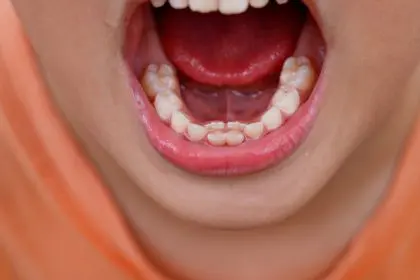Oral health often takes a backseat in our daily routines, but overlooking certain symptoms could have dire consequences. While many of us diligently brush and floss, we might miss crucial warning signs that our mouths are trying to communicate. Oral cancer, a condition that can be treated effectively if caught early, often lurks beneath the surface, making vigilance our best defense.
The hidden dangers of oral cancer
Oral cancer is not a rare occurrence. According to the American Cancer Society, an estimated 54,010 new cases of oral cavity or oropharyngeal cancer will be diagnosed in the United States in 2023. Early detection dramatically improves the prognosis, with the 5-year survival rate for localized oral cavity and pharynx cancers at 85%. However, this rate drops significantly to 41% for cases where the cancer has spread to distant parts of the body.
Five warning signs that demand attention
1. Stubborn sores that refuse to heal
One of the most common early indicators of oral cancer is the presence of persistent sores or ulcers in the mouth. While it’s easy to dismiss a small sore as a result of accidentally biting your cheek or burning your mouth on hot food, any lesion that doesn’t heal within two weeks warrants professional attention.
What to watch for: Pay close attention to sores that become painful, change in size, or bleed easily. These characteristics could signal a more serious underlying condition.
2. Unexplained pain or numbness
Oral cancer can manifest as discomfort that ranges from mild to severe. This pain may mimic a toothache or jaw discomfort and can even radiate throughout the face. Equally concerning is unexplained numbness or tingling sensations in the mouth or lips.
Why it matters: These sensations could indicate nerve involvement, which may occur when cancerous cells begin to invade deeper tissues. Any persistent pain or numbness without an obvious cause should be evaluated by a healthcare professional.
3. Suspicious patches in shades of white or red
The appearance of abnormal white (leukoplakia) or red (erythroplakia) patches in the mouth is another significant warning sign. These patches are often painless, making them easy to overlook, but they can indicate changes in the mucous membranes of the mouth.
Color matters: While white patches may develop due to irritation or lifestyle factors like smoking or alcohol use, red patches are of particular concern as they are more likely to be precancerous or cancerous.
4. Difficulty with basic oral functions
When oral cancer interferes with fundamental actions like chewing, swallowing, or moving the jaw and tongue, it’s a clear sign that something is amiss. These symptoms can be particularly alarming as they directly impact daily life.
Beyond discomfort: Difficulty swallowing, known medically as dysphagia, might be mistaken for a persistent sore throat. However, when it doesn’t resolve, it could indicate the presence of a tumor obstructing normal mouth function.
5. Shifting teeth or ill-fitting dentures
Changes in dental alignment or the fit of dentures can signal deeper problems within the mouth. Tumors or abnormal growths in the jaw or gums can cause teeth to shift or dentures to become uncomfortable.
Subtle changes matter: Any unexplained difference in the way your teeth align or how your dentures sit in your mouth should prompt a visit to a dental professional.
The power of prevention
Regular dental check-ups remain the frontline defense against oral cancer and other serious mouth conditions. Dentists are trained to spot potential issues early, often before symptoms become noticeable to patients.
Screening saves lives: Dental professionals can perform screenings to check for abnormalities, including unusual patches, lumps, or sore spots in the mouth. These screenings are particularly crucial for individuals with risk factors such as smoking, heavy alcohol use, or a family history of cancer.
When to seek help
The key to effective treatment of oral cancer is early detection. If you experience any of the warning signs mentioned above, don’t delay seeking medical attention. Waiting too long to address these symptoms can allow a condition to progress, making treatment more challenging and potentially less effective.
Act now: Remember, your mouth is a vital indicator of your overall health. Taking proactive steps to monitor your oral health can prevent more significant issues down the road.
A call to action for oral health
Understanding and recognizing the signs of oral cancer empowers individuals to take control of their health. From persistent sores to changes in dental alignment, these warning signs are easy to overlook but crucial to recognize.
By staying vigilant about oral health and seeking timely professional help, we can prevent severe health consequences and potentially save lives. Regular healthcare appointments and routine dental check-ups remain our best defense against serious mouth conditions.
Take charge of your oral health today. Your future self will thank you for your vigilance and care.
This story was created using AI technology.















